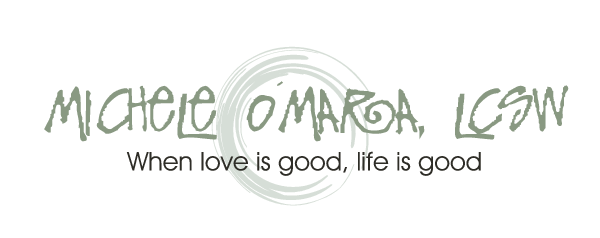
| Couples Counseling |
| Individual Counseling |
| available Classes |
| Workshops & Retreats |
| Distance Counseling |
| Transgender services |
| About Michele |
6450 W. 10th Street, Suite 7
Indianapolis, IN 46214
317.517.0065
Being a Grown Up Gay/Lesbian
by Michele O'Mara, LCSW
I never felt married, until I got married. I got married twice, in fact, to the same person. The legal ceremony, if you will, took place in Canada (no bitterness there, right?)I don't have a long history of partners, if you consider that my real years of dating (you know, the ones that are gender-appropriate) didn't start until I was 21. Until I met Teresa, my Canadian (no, she's not Canadian, just our marriage is) wife, I never felt a sense of permanence about my relationships. With her, though, it was like I'd always heard... I just knew.
For years, like many gay and lesbian people I know, I made choices that prioritized my family of origin above my partner. If a choice was to be made about who I was going to prioritize (or more specifically, who I would not risk disappointing) it was automatically - without even thinking - my family of origin.
I think two things about this. My bT (before Teresa) relationships were not committed enough, permanent enough, or certain enough, for me to feel like it was safe or smart to cut the apron strings.
When I talk about cutting the apron strings, I'm talking about creating a shift from viewing your family of origin as your "primary relationship" to viewing your newly created relationship with your partner as your primary relationship. This shift changes the decisions you make from what is best for my family of origin, to what is best for my newly created grown-up family. This transition is often very painful for parents, and their fears and disappointment in losing you may inadvertently cause them to challenge your decisions, or make cutting the apron strings more difficult.The second thing I think about why I delayed cutting the apron strings in my life is, I was not committed enough to myself, or certain enough in my own skin, to trust that it was okay, or even acceptable (based on my own Imago) to cut the apron strings.Well, as love would have it, Teresa came equipped with her own pair of scissors. What initially felt to me like a serious design flaw in our relationship ("how," I would ask myself, "can she not see how important my family is to me?") has become a most important gift. If you haven't noticed this yourself, our relationships are full of these kinds of gifts, that are initially disguised as serious character flaws in our partners.
With these scissors, she helped me see that this was not a situation where I am choosing "either my family of origin, or her" rather, it is about knowing how to prioritize my adult relationships - just like my parents had to do to build their family, and their parents before them, and on.
In this process I discovered the difference between the family in which I am a child, and the family in which I am an adult. This difference is key to understanding the importance of "growing-up" in our adult relationships. To be responsible to ourselves, our future, and our relationship, we must be sure that we nurture connections that will sustain us into the years we continue to live after our parent's are no longer alive.
Grown-up relationship boundaries mean that each partner in the relationship promises to protect the relationship from anything that does not offer to improve the physical or emotional health of each partner, or the intimacy of the relationship.
In order for us to establish and respect these boundaries, we must internalize the importance and validity of them. And we must expect those around us to respect our adult relationships as much as their own. We only risk "disappointing" our family of origin if they do not respect or value the new relationship that we have made.
Fortunately, this has not been true for most of the members of our family, but it is certainly true of many gay and lesbian families. We have much to learn from our heterosexual brothers and sisters on this issue. It is expected in our culture for heterosexuals to marry, create their own families, and make decisions in the best interest of their new families. It stands to reason then, if we wish for this to become the norm in our relationships too, then we must step into the belief that it is not only okay, but it is essential to the health of our relationships.